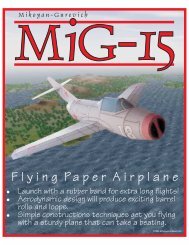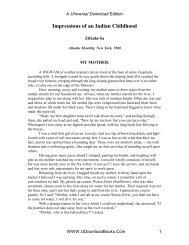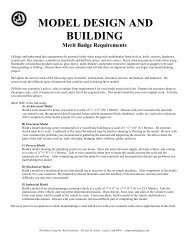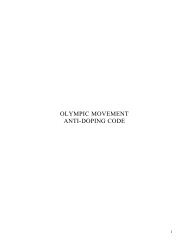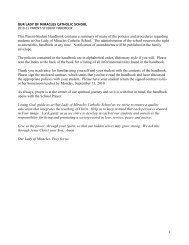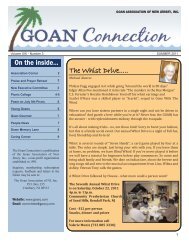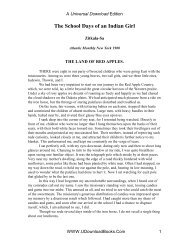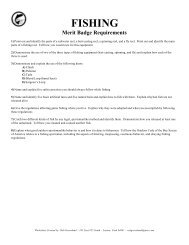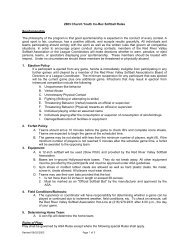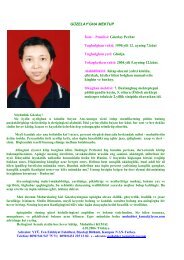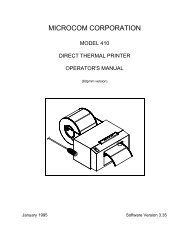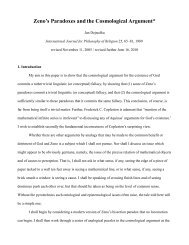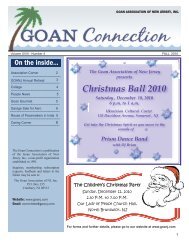Dummett's Backward Road to Frege and to Intuitionism - Tripod
Dummett's Backward Road to Frege and to Intuitionism - Tripod
Dummett's Backward Road to Frege and to Intuitionism - Tripod
Create successful ePaper yourself
Turn your PDF publications into a flip-book with our unique Google optimized e-Paper software.
much as senses are. They have no use outside of speech, <strong>and</strong> their use is what they are. (Of course,<br />
even a happy humming or a comm<strong>and</strong>ing look is expressive in some sense.) Thus we should, after<br />
taking their subjective components as objects (a single take), construe reference <strong>to</strong> the <strong>to</strong>ne T, the force<br />
F, or the explication E as indirect reference by analogy <strong>to</strong> indirect reference <strong>to</strong> the sense S. In contrast,<br />
reference <strong>to</strong> objects we double take such entities <strong>to</strong> be on the second model is direct reference. But<br />
either way, we have a unified explanation of why <strong>Frege</strong> sees no problem for senses, <strong>to</strong>nes or forces like<br />
the problem of the concept horse.<br />
To sum up, <strong>Frege</strong> provides reasons why senses, ideas, <strong>to</strong>nes, <strong>and</strong> forces cannot function as—<br />
<strong>and</strong> so cannot be—objects or functions. Yet Dummett reduces <strong>Frege</strong> <strong>to</strong> two categories, objects <strong>and</strong><br />
functions. Because he honestly believes <strong>Frege</strong> actually says this, he is constrained in<strong>to</strong> pounding square<br />
<strong>and</strong> triangular pegs in<strong>to</strong> round holes, <strong>and</strong> reducing <strong>Frege</strong>’s jungle <strong>to</strong> a desert.<br />
Dummett is steering a heroic course in the face of great difficulties, pursuing a mirage of <strong>Frege</strong><br />
as an austere dualist with two categories, objects <strong>and</strong> functions. <strong>Frege</strong>’s austerity lies deeper, in his<br />
severe tie of on<strong>to</strong>logical category <strong>to</strong> linguistic function. This results in a profusion of categories due <strong>to</strong><br />
the profusion of linguistic functions. The textual difficulties vanish. We also see the whole linguistic<br />
turn. Dummett is right <strong>to</strong> pinpoint the turn in <strong>Frege</strong>’s requirement that for objects <strong>to</strong> be named, a<br />
criterion for their identity must be provided. But objects are just the tip of the iceberg. In fact, we see<br />
here an anticipation of the later Wittgenstein on the many different functions of language, though not<br />
anything like Wittgenstein’s prolixity of indefinitely many linguistic functions, since <strong>Frege</strong> admits only<br />
four categories of linguistic function: reference, sense, force, <strong>and</strong> <strong>to</strong>ne.<br />
If I am right, then <strong>Frege</strong> anticipates the later Wittgenstein <strong>to</strong>olbox metaphor (Investigations #<br />
11) <strong>and</strong> engine control h<strong>and</strong>les metaphor (Investigations # 12) for the diverse functions of words. But<br />
where Wittgenstein allows indefinitely many functions of words, <strong>Frege</strong> allows only five at most. For<br />
<strong>Frege</strong>: names (1) express senses <strong>and</strong> (2) refer <strong>to</strong> references; sentences which are not mere suppositions<br />
60



